2023届高三英语二轮复习虚拟语气课件(共24张PPT)
文档属性
| 名称 | 2023届高三英语二轮复习虚拟语气课件(共24张PPT) |  | |
| 格式 | zip | ||
| 文件大小 | 122.3KB | ||
| 资源类型 | 教案 | ||
| 版本资源 | 通用版 | ||
| 科目 | 英语 | ||
| 更新时间 | 2023-01-14 21:15:08 | ||
图片预览

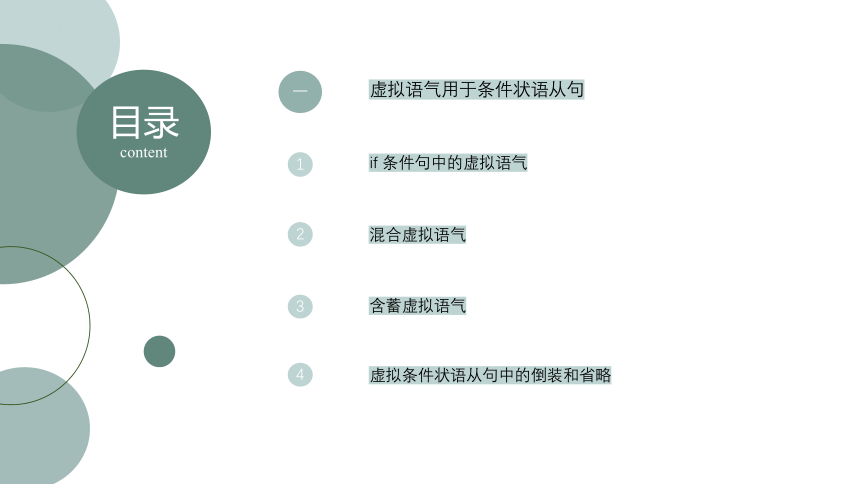
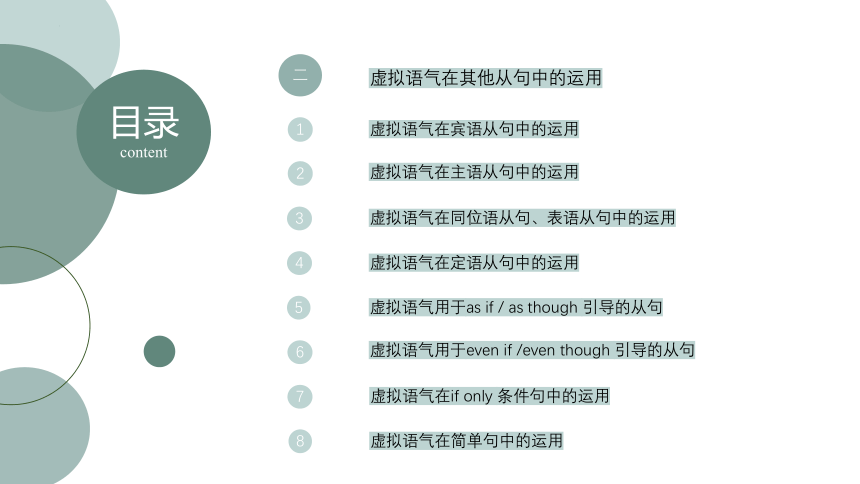

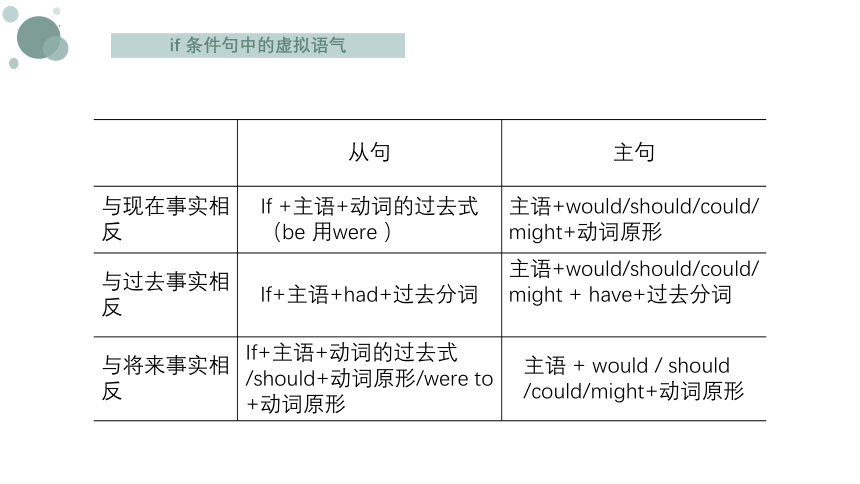
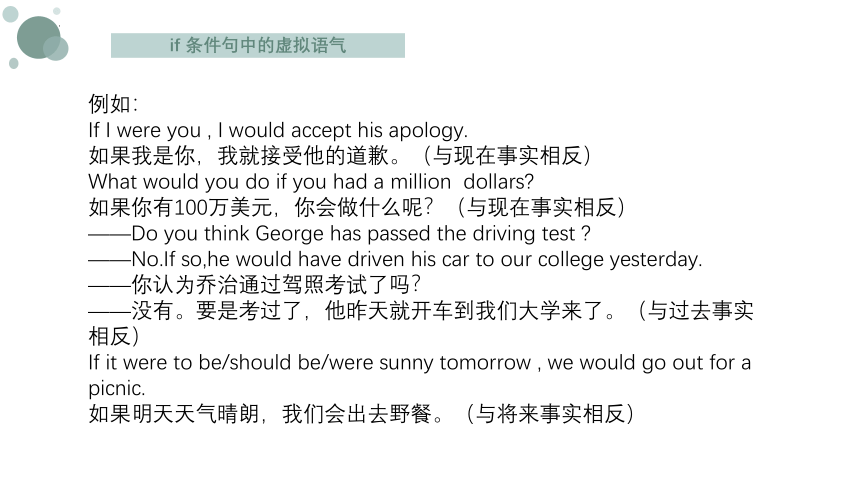
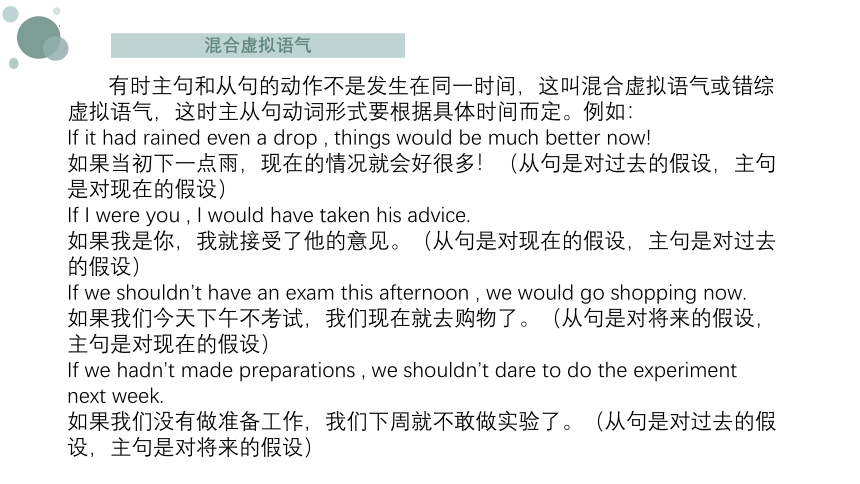
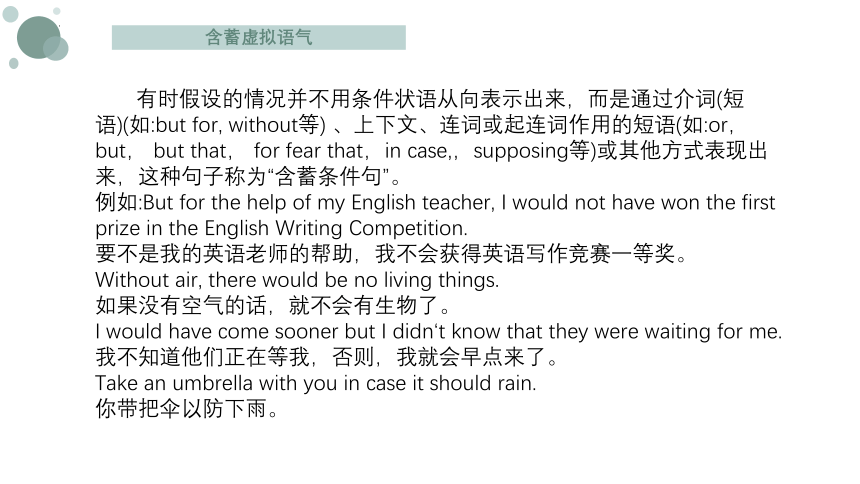
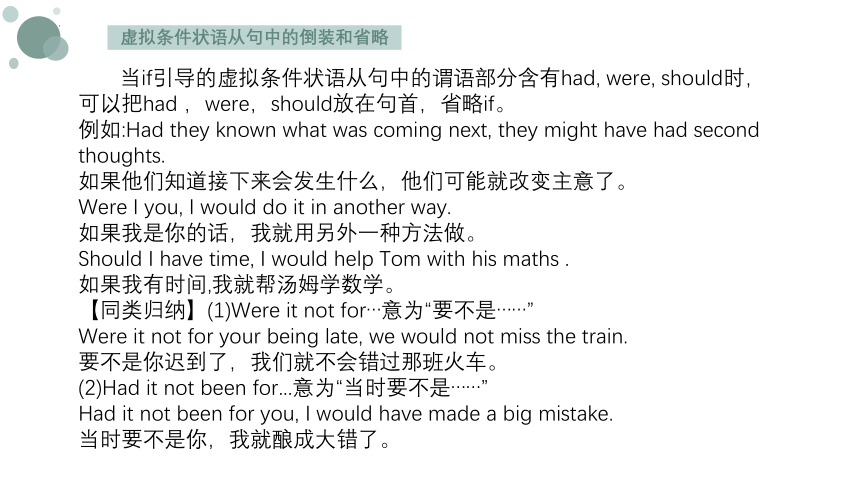
文档简介
(共24张PPT)
虚拟语气
subjunctive mood
目录
content
一
虚拟语气用于条件状语从句
1
if 条件句中的虚拟语气
2
混合虚拟语气
3
含蓄虚拟语气
4
虚拟条件状语从句中的倒装和省略
目录
content
二
虚拟语气在其他从句中的运用
1
虚拟语气在宾语从句中的运用
2
虚拟语气在主语从句中的运用
3
虚拟语气在同位语从句、表语从句中的运用
4
虚拟语气在定语从句中的运用
5
虚拟语气用于as if / as though 引导的从句
6
7
8
虚拟语气用于even if /even though 引导的从句
虚拟语气在if only 条件句中的运用
虚拟语气在简单句中的运用
虚拟语气用于条件状语从句
if 条件句中的虚拟语气
从句 主句
与现在事实相反 If +主语+动词的过去式(be 用were ) 主语+would/should/could/ might+动词原形
与过去事实相反 If+主语+had+过去分词 主语+would/should/could/ might + have+过去分词
与将来事实相反 If+主语+动词的过去式/should+动词原形/were to +动词原形 主语 + would / should /could/might+动词原形
if 条件句中的虚拟语气
例如:
If I were you , I would accept his apology.
如果我是你,我就接受他的道歉。(与现在事实相反)
What would you do if you had a million dollars
如果你有100万美元,你会做什么呢?(与现在事实相反)
——Do you think George has passed the driving test
——No.If so,he would have driven his car to our college yesterday.
——你认为乔治通过驾照考试了吗?
——没有。要是考过了,他昨天就开车到我们大学来了。(与过去事实相反)
If it were to be/should be/were sunny tomorrow , we would go out for a picnic.
如果明天天气晴朗,我们会出去野餐。(与将来事实相反)
混合虚拟语气
有时主句和从句的动作不是发生在同一时间,这叫混合虚拟语气或错综虚拟语气,这时主从句动词形式要根据具体时间而定。例如:
If it had rained even a drop , things would be much better now!
如果当初下一点雨,现在的情况就会好很多!(从句是对过去的假设,主句是对现在的假设)
If I were you , I would have taken his advice.
如果我是你,我就接受了他的意见。(从句是对现在的假设,主句是对过去的假设)
If we shouldn’t have an exam this afternoon , we would go shopping now.
如果我们今天下午不考试,我们现在就去购物了。(从句是对将来的假设,主句是对现在的假设)
If we hadn’t made preparations , we shouldn’t dare to do the experiment next week.
如果我们没有做准备工作,我们下周就不敢做实验了。(从句是对过去的假设,主句是对将来的假设)
含蓄虚拟语气
有时假设的情况并不用条件状语从向表示出来,而是通过介词(短语)(如:but for, without等) 、上下文、连词或起连词作用的短语(如:or,but, but that, for fear that,in case,,supposing等)或其他方式表现出来,这种句子称为“含蓄条件句”。
例如:But for the help of my English teacher, I would not have won the first prize in the English Writing Competition.
要不是我的英语老师的帮助,我不会获得英语写作竞赛一等奖。
Without air, there would be no living things.
如果没有空气的话,就不会有生物了。
I would have come sooner but I didn‘t know that they were waiting for me.
我不知道他们正在等我,否则,我就会早点来了。
Take an umbrella with you in case it should rain.
你带把伞以防下雨。
虚拟条件状语从句中的倒装和省略
当if引导的虚拟条件状语从句中的谓语部分含有had, were, should时,可以把had ,were,should放在句首,省略if。
例如:Had they known what was coming next, they might have had second thoughts.
如果他们知道接下来会发生什么,他们可能就改变主意了。
Were I you, I would do it in another way.
如果我是你的话,我就用另外一种方法做。
Should I have time, I would help Tom with his maths .
如果我有时间,我就帮汤姆学数学。
【同类归纳】(1)Were it not for…意为“要不是……”
Were it not for your being late, we would not miss the train.
要不是你迟到了,我们就不会错过那班火车。
(2)Had it not been for...意为“当时要不是……”
Had it not been for you, I would have made a big mistake.
当时要不是你,我就酿成大错了。
虚拟条件状语从句中的倒装和省略
【注意】(1)当省略的条件句中的谓语动词是否定形式时,不能用动词的缩略形式。
(× ) Weren't it for the expense , I would go abroad now.
(√ ) Were it not for the expense, I would go abroad now.
要不是费用问题,我现在就出国。
(2)有时虚拟条件状语从句或者主句可以省略,只剩下一个主句或条件状语从句。
If I had time. 我要是有时间该多好啊。(省略主句)
She should have come to the party. 她本应该来参加聚会的。(省略条件状语从句)
虚拟语气在其他从句中的运用
虚拟语气在宾语从句中的运用
Point 1 wish后的宾语从句中的虚拟语气
(1)与现在的事实相反时,从句用一般过去时。
例如:I wish they weren’t always late. 我真希望他们不要总是迟到。
I wish it were spring in my hometown all year round.
我真希望我的家乡四季如春。
【注意】在虚拟语气中,be 在各种人称的句子中都用were。
(2)与过去事实相反时,从句用过去完成时。
例如:I wish you had let me know earlier. 我倒希望你早点儿让我知道。
He wishes he hadn’t lost the chance. 他真希望没有失去那次机会。
(3)表示将来的主观愿望时,从句谓语动词用“could/would+动词原形”的形式。
例如:I wish you would be quiet. 我真希望你安静一些。
I wish you could come to the party tomorrow. 但愿你明天能来参加聚会。
虚拟语气在宾语从句中的运用
Point 2 在表示建议、 命令、要求、忠告等的动词后面,宾语从句中用虚拟语气(即“should+动词原形”,should可省略。)
常见的此类词有 : 一坚持: insist ; 二命令 : order,command ; 三建议 : suggest, propose, advise; 四要求:request, require, demand, ask。
例如:Teachers recommend parents ( should ) not allow their children under 12 to ride bicycles to school for safety.
为了安全,老师们劝告家长不要让自己12岁以下的孩子骑自行车上学。
The teacher advised that we ( should ) make good use of every minute here.
老师劝我们要好好地利用在这儿的每一分钟。
【注意】当insist的意思为“坚决认为,坚持说”,suggest的意思为“表明;暗含,暗示”时,宾语从句一般不用虚拟语气。
例如:Tom insisted that he hadn't stolen the watch.
汤姆坚持说他没有偷那块手表。
虚拟语气在宾语从句中的运用
Point 3 would rather引导的宾语从句中的虚拟语气
在would rather引导的宾语从句中,用一般过去时表示对现在或将来的假设,用过去完成时表示对过去的假设。
例如:
George is going to talk about the geography of his country, but I'd rather he focused more on its culture.
乔治打算谈论他的国家的地理,但是我宁愿他更多地集中于文化。
You don't have to be in such a hurry. I would rather you went on business first.
你没有必要这么着急。我宁愿你先去出差。
虚拟语气在宾语从句中的运用
Point 4 had hoped后宾语从句中的虚拟语气
用had hoped表示原来希望做到而实际上未能实现的事情,其后的宾语从句的谓语用“would+动词原形”。
例如:I had hoped that she would go to the U.S. and study there, but she said she liked to stay in China.
我原本看望她到美国去念书,但她说她喜欢留在中国。
虚拟语气在主语从句中的运用
在主语从句中,虚拟语气用“(should) +动词原形”。这种主语从句由连词that引导。常用于以下三种句型中。
Point 1 It + be + adj. + that...
在这一类的结构中常见的形容词有: important , necessary , desirable ,imperative , advisable 等。
例如: It is important that every member ( should ) inform himself of these rules.
重要的是每个成员都要知道这些规则。
It is impossible that he ( should) go home. 他不可能回家去。
虚拟语气在主语从句中的运用
Point 2 It +be +名词(短语)+ that...
常见的名词(短语)有:pity, regret, desire,shame,honor, surprise, no wonder等。
例如:
It’s a pity that you ( should ) have to leave.
你非走不可真是遗憾。
It is his desire that a medical man ( should ) stay here.
他希望有一个医务人员留在这里。
It is no wonder that he ( should) miss the train.
他错过了那班火车不足为奇。
虚拟语气在主语从句中的运用
Point 3 It + be + 过去分词+ that…
常见的过去分词有:desired,suggested,proposed,requested,decided等。
例如:
It is suggested that parents ( should ) spend more time with their children alone.
人们建议父母应该花更多的时间和孩子单独相处。
It was proposed that this matter ( should) be considered at the next meeting.
有人提议此事下次会议再讨论。
It is requested that a vote (should) be taken.
有人要求投票表决。
It is required that the students ( should ) learn a foreign language.
学生们被要求学一门外语。
虚拟语气在同位语从句、表语从句中的运用
表示请求、要求、命令、建议等的名词,如advice , desire, decision, idea, instruction, order, plan, proposal , recommendation , request , requirement , suggestion , wish等后面的同位语从句和表语从句要用虚拟语气,即从句的谓语动词用“(should + )动词原形”。
例如:
He told us his idea that he ( should) go to university.
他告诉了我们他的想法:他应该上大学。
My suggestion is that we should try to cut back on production and reduce the amount of things we make and buy.
我的建议是,我们应当尽量削减生产,减少制造和购买物品的数量。
虚拟语气在定语从句中的运用
这种用法常用于“It is time/high time/ about time that … "句型中。从句通常用一般过去时或从句谓语动词用“should/ought to +动词原形”。
例如:
Jack is a great talker . It’s high time that he did something instead of just talking.
杰克是一个大空谈家,到他该做事情而不是空谈的时候了。
It’s high time that we went to school. 我们该上学了。
In my opinion, it is about time that we should have new computers.
在我看来,我们是时候应该拥有新的电脑。
虚拟语气用于as if/as though引导的从句
as if/as though引导的表语从句或状语从句中用虚拟语气。与现在事实相反时,从句用一般过去时;与过去事实相反时,从句用过去完成时(即"had +过去分词");与将来事实相反时,从句谓语动词用“would/might/ could +动词原形”。
例如:He treats me as if I were a stranger.
他待我如陌生人。(与现在事实相反)
I've been working all day, but I feel as if I had achieved nothing.
我整天一直在工作,但我感觉好像一事无成。(与过去事实相反)
It seems as if/as though the meeting would never end.
会议似乎永远也开不完。(与将来事实相反)
【注意】 as if/as though也可引导表事实或很可能是事实的从句,常用在系动词look , seem , taste , smell, sound等词后。
It looks as if it is going to rain. 看上去仿佛要下雨了。(事实上马上就要下面)
虚拟语气用于even if/even though引导的从句
even if/even though 引导让步状语从句。表示与现在事实相反时,从句用一般过去时,主句谓语动词用“could/would/might/should+动词原形”;表示与过去事实相反时,从句用过去完成时,主句谓语动词用“could/would/might/should + have +过去分词”。
例如:Even if he were here himself, he should not know what to do.
即使他亲自来了他也不知道怎么办。(even if引导的状语从句,与现在事实相反)
Even though I had been very busy then, I would have helped you out.
即使我当时很忙我还是会帮你一把的。(even though引导的状语从句,与过去事实相反)
虚拟语气在if only条件句中的运用
Point 1 if only引导的条件句中,表示与现在事实相反,从句用一般过去时;表示与过去事实相反,从句用过去完成时。if only后跟虚拟语气表示“要是……就好了”。
例如:If only I knew her name.
我要是知道她的名字就好了。(与现在事实相反)
"If only she'd sticked to one color," he muttered to himself crossly.
“如果她坚持用一种颜色就好了,”他生气地小声嘀咕着。(与过去事实相反)
If only he had lain quietly as the doctor instructed he would not suffer so much now.
要是按照医生的指示安静地躺着,他现在就不会这样痛苦了。(从句与过去事实相反,主句与现在事实相反)
Point 2 if only引起的感叹句表示愿望时,用虚拟语气。
例如:If only he were here!
要是他在这儿就好了!
虚拟语气在简单句中的运用
Point 1 说话时,为了表示客气、谦虚、委婉而有礼貌,常使用虚拟语气。这一结构为“would/could/ might/ should +动词原形”。
例如:Would you mind holding your tongue
你别唠叨好不好
You should always learn this lesson by heart.
你要一直把这个教训牢记于心。
I should agree with you.
我应该同意你的观点。
Point 2 表示“祝愿”时,常用“may+主语+动词原形+其他”结构。
例如:May all your dreams come true! 祝你的一切梦想成真!
虚拟语气
subjunctive mood
目录
content
一
虚拟语气用于条件状语从句
1
if 条件句中的虚拟语气
2
混合虚拟语气
3
含蓄虚拟语气
4
虚拟条件状语从句中的倒装和省略
目录
content
二
虚拟语气在其他从句中的运用
1
虚拟语气在宾语从句中的运用
2
虚拟语气在主语从句中的运用
3
虚拟语气在同位语从句、表语从句中的运用
4
虚拟语气在定语从句中的运用
5
虚拟语气用于as if / as though 引导的从句
6
7
8
虚拟语气用于even if /even though 引导的从句
虚拟语气在if only 条件句中的运用
虚拟语气在简单句中的运用
虚拟语气用于条件状语从句
if 条件句中的虚拟语气
从句 主句
与现在事实相反 If +主语+动词的过去式(be 用were ) 主语+would/should/could/ might+动词原形
与过去事实相反 If+主语+had+过去分词 主语+would/should/could/ might + have+过去分词
与将来事实相反 If+主语+动词的过去式/should+动词原形/were to +动词原形 主语 + would / should /could/might+动词原形
if 条件句中的虚拟语气
例如:
If I were you , I would accept his apology.
如果我是你,我就接受他的道歉。(与现在事实相反)
What would you do if you had a million dollars
如果你有100万美元,你会做什么呢?(与现在事实相反)
——Do you think George has passed the driving test
——No.If so,he would have driven his car to our college yesterday.
——你认为乔治通过驾照考试了吗?
——没有。要是考过了,他昨天就开车到我们大学来了。(与过去事实相反)
If it were to be/should be/were sunny tomorrow , we would go out for a picnic.
如果明天天气晴朗,我们会出去野餐。(与将来事实相反)
混合虚拟语气
有时主句和从句的动作不是发生在同一时间,这叫混合虚拟语气或错综虚拟语气,这时主从句动词形式要根据具体时间而定。例如:
If it had rained even a drop , things would be much better now!
如果当初下一点雨,现在的情况就会好很多!(从句是对过去的假设,主句是对现在的假设)
If I were you , I would have taken his advice.
如果我是你,我就接受了他的意见。(从句是对现在的假设,主句是对过去的假设)
If we shouldn’t have an exam this afternoon , we would go shopping now.
如果我们今天下午不考试,我们现在就去购物了。(从句是对将来的假设,主句是对现在的假设)
If we hadn’t made preparations , we shouldn’t dare to do the experiment next week.
如果我们没有做准备工作,我们下周就不敢做实验了。(从句是对过去的假设,主句是对将来的假设)
含蓄虚拟语气
有时假设的情况并不用条件状语从向表示出来,而是通过介词(短语)(如:but for, without等) 、上下文、连词或起连词作用的短语(如:or,but, but that, for fear that,in case,,supposing等)或其他方式表现出来,这种句子称为“含蓄条件句”。
例如:But for the help of my English teacher, I would not have won the first prize in the English Writing Competition.
要不是我的英语老师的帮助,我不会获得英语写作竞赛一等奖。
Without air, there would be no living things.
如果没有空气的话,就不会有生物了。
I would have come sooner but I didn‘t know that they were waiting for me.
我不知道他们正在等我,否则,我就会早点来了。
Take an umbrella with you in case it should rain.
你带把伞以防下雨。
虚拟条件状语从句中的倒装和省略
当if引导的虚拟条件状语从句中的谓语部分含有had, were, should时,可以把had ,were,should放在句首,省略if。
例如:Had they known what was coming next, they might have had second thoughts.
如果他们知道接下来会发生什么,他们可能就改变主意了。
Were I you, I would do it in another way.
如果我是你的话,我就用另外一种方法做。
Should I have time, I would help Tom with his maths .
如果我有时间,我就帮汤姆学数学。
【同类归纳】(1)Were it not for…意为“要不是……”
Were it not for your being late, we would not miss the train.
要不是你迟到了,我们就不会错过那班火车。
(2)Had it not been for...意为“当时要不是……”
Had it not been for you, I would have made a big mistake.
当时要不是你,我就酿成大错了。
虚拟条件状语从句中的倒装和省略
【注意】(1)当省略的条件句中的谓语动词是否定形式时,不能用动词的缩略形式。
(× ) Weren't it for the expense , I would go abroad now.
(√ ) Were it not for the expense, I would go abroad now.
要不是费用问题,我现在就出国。
(2)有时虚拟条件状语从句或者主句可以省略,只剩下一个主句或条件状语从句。
If I had time. 我要是有时间该多好啊。(省略主句)
She should have come to the party. 她本应该来参加聚会的。(省略条件状语从句)
虚拟语气在其他从句中的运用
虚拟语气在宾语从句中的运用
Point 1 wish后的宾语从句中的虚拟语气
(1)与现在的事实相反时,从句用一般过去时。
例如:I wish they weren’t always late. 我真希望他们不要总是迟到。
I wish it were spring in my hometown all year round.
我真希望我的家乡四季如春。
【注意】在虚拟语气中,be 在各种人称的句子中都用were。
(2)与过去事实相反时,从句用过去完成时。
例如:I wish you had let me know earlier. 我倒希望你早点儿让我知道。
He wishes he hadn’t lost the chance. 他真希望没有失去那次机会。
(3)表示将来的主观愿望时,从句谓语动词用“could/would+动词原形”的形式。
例如:I wish you would be quiet. 我真希望你安静一些。
I wish you could come to the party tomorrow. 但愿你明天能来参加聚会。
虚拟语气在宾语从句中的运用
Point 2 在表示建议、 命令、要求、忠告等的动词后面,宾语从句中用虚拟语气(即“should+动词原形”,should可省略。)
常见的此类词有 : 一坚持: insist ; 二命令 : order,command ; 三建议 : suggest, propose, advise; 四要求:request, require, demand, ask。
例如:Teachers recommend parents ( should ) not allow their children under 12 to ride bicycles to school for safety.
为了安全,老师们劝告家长不要让自己12岁以下的孩子骑自行车上学。
The teacher advised that we ( should ) make good use of every minute here.
老师劝我们要好好地利用在这儿的每一分钟。
【注意】当insist的意思为“坚决认为,坚持说”,suggest的意思为“表明;暗含,暗示”时,宾语从句一般不用虚拟语气。
例如:Tom insisted that he hadn't stolen the watch.
汤姆坚持说他没有偷那块手表。
虚拟语气在宾语从句中的运用
Point 3 would rather引导的宾语从句中的虚拟语气
在would rather引导的宾语从句中,用一般过去时表示对现在或将来的假设,用过去完成时表示对过去的假设。
例如:
George is going to talk about the geography of his country, but I'd rather he focused more on its culture.
乔治打算谈论他的国家的地理,但是我宁愿他更多地集中于文化。
You don't have to be in such a hurry. I would rather you went on business first.
你没有必要这么着急。我宁愿你先去出差。
虚拟语气在宾语从句中的运用
Point 4 had hoped后宾语从句中的虚拟语气
用had hoped表示原来希望做到而实际上未能实现的事情,其后的宾语从句的谓语用“would+动词原形”。
例如:I had hoped that she would go to the U.S. and study there, but she said she liked to stay in China.
我原本看望她到美国去念书,但她说她喜欢留在中国。
虚拟语气在主语从句中的运用
在主语从句中,虚拟语气用“(should) +动词原形”。这种主语从句由连词that引导。常用于以下三种句型中。
Point 1 It + be + adj. + that...
在这一类的结构中常见的形容词有: important , necessary , desirable ,imperative , advisable 等。
例如: It is important that every member ( should ) inform himself of these rules.
重要的是每个成员都要知道这些规则。
It is impossible that he ( should) go home. 他不可能回家去。
虚拟语气在主语从句中的运用
Point 2 It +be +名词(短语)+ that...
常见的名词(短语)有:pity, regret, desire,shame,honor, surprise, no wonder等。
例如:
It’s a pity that you ( should ) have to leave.
你非走不可真是遗憾。
It is his desire that a medical man ( should ) stay here.
他希望有一个医务人员留在这里。
It is no wonder that he ( should) miss the train.
他错过了那班火车不足为奇。
虚拟语气在主语从句中的运用
Point 3 It + be + 过去分词+ that…
常见的过去分词有:desired,suggested,proposed,requested,decided等。
例如:
It is suggested that parents ( should ) spend more time with their children alone.
人们建议父母应该花更多的时间和孩子单独相处。
It was proposed that this matter ( should) be considered at the next meeting.
有人提议此事下次会议再讨论。
It is requested that a vote (should) be taken.
有人要求投票表决。
It is required that the students ( should ) learn a foreign language.
学生们被要求学一门外语。
虚拟语气在同位语从句、表语从句中的运用
表示请求、要求、命令、建议等的名词,如advice , desire, decision, idea, instruction, order, plan, proposal , recommendation , request , requirement , suggestion , wish等后面的同位语从句和表语从句要用虚拟语气,即从句的谓语动词用“(should + )动词原形”。
例如:
He told us his idea that he ( should) go to university.
他告诉了我们他的想法:他应该上大学。
My suggestion is that we should try to cut back on production and reduce the amount of things we make and buy.
我的建议是,我们应当尽量削减生产,减少制造和购买物品的数量。
虚拟语气在定语从句中的运用
这种用法常用于“It is time/high time/ about time that … "句型中。从句通常用一般过去时或从句谓语动词用“should/ought to +动词原形”。
例如:
Jack is a great talker . It’s high time that he did something instead of just talking.
杰克是一个大空谈家,到他该做事情而不是空谈的时候了。
It’s high time that we went to school. 我们该上学了。
In my opinion, it is about time that we should have new computers.
在我看来,我们是时候应该拥有新的电脑。
虚拟语气用于as if/as though引导的从句
as if/as though引导的表语从句或状语从句中用虚拟语气。与现在事实相反时,从句用一般过去时;与过去事实相反时,从句用过去完成时(即"had +过去分词");与将来事实相反时,从句谓语动词用“would/might/ could +动词原形”。
例如:He treats me as if I were a stranger.
他待我如陌生人。(与现在事实相反)
I've been working all day, but I feel as if I had achieved nothing.
我整天一直在工作,但我感觉好像一事无成。(与过去事实相反)
It seems as if/as though the meeting would never end.
会议似乎永远也开不完。(与将来事实相反)
【注意】 as if/as though也可引导表事实或很可能是事实的从句,常用在系动词look , seem , taste , smell, sound等词后。
It looks as if it is going to rain. 看上去仿佛要下雨了。(事实上马上就要下面)
虚拟语气用于even if/even though引导的从句
even if/even though 引导让步状语从句。表示与现在事实相反时,从句用一般过去时,主句谓语动词用“could/would/might/should+动词原形”;表示与过去事实相反时,从句用过去完成时,主句谓语动词用“could/would/might/should + have +过去分词”。
例如:Even if he were here himself, he should not know what to do.
即使他亲自来了他也不知道怎么办。(even if引导的状语从句,与现在事实相反)
Even though I had been very busy then, I would have helped you out.
即使我当时很忙我还是会帮你一把的。(even though引导的状语从句,与过去事实相反)
虚拟语气在if only条件句中的运用
Point 1 if only引导的条件句中,表示与现在事实相反,从句用一般过去时;表示与过去事实相反,从句用过去完成时。if only后跟虚拟语气表示“要是……就好了”。
例如:If only I knew her name.
我要是知道她的名字就好了。(与现在事实相反)
"If only she'd sticked to one color," he muttered to himself crossly.
“如果她坚持用一种颜色就好了,”他生气地小声嘀咕着。(与过去事实相反)
If only he had lain quietly as the doctor instructed he would not suffer so much now.
要是按照医生的指示安静地躺着,他现在就不会这样痛苦了。(从句与过去事实相反,主句与现在事实相反)
Point 2 if only引起的感叹句表示愿望时,用虚拟语气。
例如:If only he were here!
要是他在这儿就好了!
虚拟语气在简单句中的运用
Point 1 说话时,为了表示客气、谦虚、委婉而有礼貌,常使用虚拟语气。这一结构为“would/could/ might/ should +动词原形”。
例如:Would you mind holding your tongue
你别唠叨好不好
You should always learn this lesson by heart.
你要一直把这个教训牢记于心。
I should agree with you.
我应该同意你的观点。
Point 2 表示“祝愿”时,常用“may+主语+动词原形+其他”结构。
例如:May all your dreams come true! 祝你的一切梦想成真!
